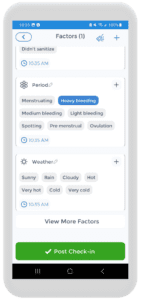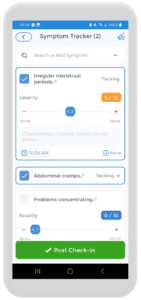
PCOS, or polycystic ovary syndrome, is a hormonal disorder that affects many women worldwide. It is a common condition that can cause a variety of symptoms, including fatigue. Fatigue can be a real challenge for those affected by PCOS, as it can make it difficult to carry out everyday activities and can significantly impact quality of life. In this article, we will explore the causes, symptoms, diagnosis, and treatment options for PCOS fatigue. We will also consider the lifestyle changes that can help manage the condition, as well as alternative and complementary therapies that may improve symptoms.[1][2][3]
What is PCOS Fatigue?
Polycystic ovary syndrome fatigue refers to an ongoing feeling of tiredness or exhaustion that is often associated with polycystic ovary syndrome. Women with PCOS may experience fatigue in various degrees of severity. For some, it may be mild and infrequent, while for others, it can be constant and debilitating. While fatigue is a common frustration for those with PCOS, it is not necessarily an inevitable symptom of the condition.
Defining Polycystic Ovary Syndrome
Polycystic ovary syndrome, or PCOS, is a hormonal disorder that affects the ovaries and can cause changes in the menstrual cycle, fertility problems, and a range of other symptoms. Some of the most common symptoms of PCOS include acne, hirsutism (excessive hair growth), weight gain, and mood changes. Although the exact cause of PCOS is still unknown, it is believed to be related to hormone imbalances.
PCOS affects approximately 10% of women of reproductive age and is one of the most common endocrine disorders in women.
Symptoms of PCOS Fatigue
Polycystic ovary syndrome fatigue can have a range of symptoms. Some of the leading symptoms reported include:
- General sense of tiredness or exhaustion
- Difficulty concentrating or focusing
- Slower reaction times
- Feelings of irritability or frustration
- Difficulty with physical or mental tasks that were previously manageable
The symptoms of PCOS fatigue can make it difficult to maintain an active and fulfilling lifestyle. For women with PCOS, fatigue can make it difficult to complete daily tasks or to engage in hobbies, social events, or other activities that require additional energy.
How PCOS Affects Energy Levels
Many women with polycystic ovarian syndrome experience fatigue because changes in hormone and insulin levels can affect their energy levels. PCOS can cause an overproduction of insulin, which can lead to insulin resistance and fluctuations in blood sugar levels. This can cause chronic inflammation in the body, which can exacerbate fatigue. Hormonal imbalances related to PCOS can also lead to sleep problems and mood changes, which can further contribute to extreme fatigue and constant tiredness.
Additionally, women with PCOS may have lower levels of certain hormones, such as progesterone, which can also contribute to fatigue. Progesterone helps regulate obstructive sleep and mood, so a deficiency in this hormone can cause disruptions in these areas.
Managing PCOS Fatigue
While there is no cure for PCOS, there are several ways of fighting fatigue and disease control associated with the condition:
- Regular exercise: Exercise can help improve energy levels and reduce fatigue. It is important to

- Healthy diet: Eating a balanced diet that is rich in whole foods can help regulate blood sugar levels and reduce inflammation in the body.
- Sleep hygiene: Practicing good quality sleep habits, such as sticking to a regular sleep schedule and creating a relaxing bedtime routine, can help improve sleep quality and reduce fatigue.
- Stress management: Stress can exacerbate fatigue, so finding healthy ways to manage stress, such as meditation or yoga, can be helpful.
- Medications: In some cases, medications may be prescribed to help manage symptoms of PCOS, including fatigue.
It is important for women with PCOS to work with their healthcare provider to develop a personalized treatment plan that addresses their individual symptoms and needs.[4][5][6][7][8][9]
Causes of PCOS Fatigue
Polycystic ovary syndrome (PCOS) is a hormonal disorder that affects many women of reproductive age. One of the most common symptoms of PCOS is fatigue, which can have a significant impact on a woman’s quality of life. In this article, we will explore some of the underlying causes of PCOS fatigue, and what women with PCOS can do to manage their symptoms.
Hormonal Imbalances
Hormone imbalance is one of the primary underlying causes of PCOS, and can contribute to fatigue. For example, women with PCOS may have higher levels of testosterone than is typical, which can cause fatigue, as well as hirsutism (excessive hair growth), and acne. Additionally, women with PCOS may have lower levels of estrogen, which can cause mood changes and fatigue.
It is important to note that hormonal imbalance can vary widely among women with PCOS, and some women may experience more severe symptoms than others. Women with PCOS who are experiencing fatigue should talk to their healthcare provider about hormone testing and treatment options.
Blood Sugar Fluctuations and Insulin Resistance
Insulin resistance is another common characteristic of polycystic ovarian syndrome that can cause fatigue. Insulin is a hormone that regulates blood sugar levels, and when we eat, insulin signals the body’s cells to absorb glucose from the bloodstream. However, in women with PCOS, insulin resistance can occur, and the cells become less responsive to insulin. This can lead to increased blood sugar levels and associated fatigue.
In addition to fatigue, insulin resistance can also increase a woman’s risk of developing type 2 diabetes. Women with PCOS who are experiencing fatigue and other symptoms of insulin resistance should talk to their healthcare provider about lifestyle changes and medications that can help manage their blood sugar levels and improve insulin resistance.
Sleep Disturbances
Sleep disturbances can also cause fatigue in women with PCOS. Hormonal imbalances that are characteristic of PCOS can affect the body’s internal clock, making it more difficult to fall asleep or stay asleep. Additionally, obstructive sleep apnea and snoring are more common in women with PCOS, which can make it difficult to get restful sleep, leading to poor sleep and daytime fatigue.
Women with PCOS who are experiencing sleep disturbances and poor sleep quality should talk to their healthcare provider about strategies for improving their sleep hygiene, as well as treatment options for obstructive sleep apnea and other sleep disturbances.
Chronic Inflammation
Chronic inflammation is another common characteristic of PCOS that can contribute to fatigue. It occurs when the body’s immune system is constantly activated, which can cause damage to tissues throughout the body. This can lead to fatigue, muscle aches, and other symptoms.
Women with PCOS who are experiencing fatigue and other symptoms of chronic inflammation should talk to their healthcare provider about lifestyle changes and medications that can help manage their symptoms. In some cases, anti-inflammatory medications may be prescribed to help reduce inflammation and improve energy levels.
Mental Health Factors
Finally, certain mental health conditions can contribute to fatigue in women with PCOS. Many women with PCOS experience depression, anxiety, or other mood disorders, which can lead to fatigue. Additionally, women with PCOS may struggle with maintaining a healthy work-life balance, which can lead to stress and fatigue.
Women with PCOS who are experiencing mental health issues should talk to their healthcare provider about counseling and other treatment options. In some cases, medications may be prescribed to help manage symptoms of depression and anxiety.
In conclusion, fatigue is a common symptom of PCOS that can have a significant impact on a woman’s quality of life. However, with the right treatment and management strategies, women with PCOS can improve their energy levels and feel better overall.[10][11]
Diagnosing PCOS Fatigue
Polycystic ovary syndrome (PCOS) is a common hormonal disorder that affects women of reproductive age. It is characterized by a variety of symptoms, including irregular periods, acne, weight gain, and fatigue. Fatigue is a common symptom of PCOS and can significantly impact a woman’s quality of life. In order to diagnose PCOS-related fatigue, a doctor will typically perform a series of tests and evaluations.
Medical History and Physical Examination
The first step in diagnosing PCOS fatigue is a thorough medical history and physical examination. During the medical history, the doctor will ask the patient about their symptoms, including when they first noticed them and how severe they are. They will also ask about the patient’s menstrual cycle, as irregular periods are a common symptom of PCOS. The doctor will also review the patient’s medical history to evaluate whether the symptoms are related to PCOS.
During the physical examination, the doctor will evaluate the patient’s overall health and look for signs of PCOS. They may perform a pelvic exam to check for cysts on the ovaries, which is a hallmark of PCOS. They may also check the patient’s blood pressure, weight, and body mass index (BMI) to evaluate their overall health and to rule out other underlying conditions that may be contributing to chronic fatigue alone.
Blood Test and Hormone Levels
Blood tests and hormone levels can also help diagnose PCOS. A blood test can evaluate red blood cells and various hormone levels, including testosterone, estrogen, and insulin, which can help identify hormonal imbalances related to PCOS. Additionally, blood glucose levels can be measured to evaluate insulin resistance, which can contribute to fatigue.
Other blood tests that may be performed include a lipid panel to evaluate cholesterol levels and a complete blood count (CBC) to evaluate iron levels and red and white blood cell counts. These tests can help identify other underlying conditions that may be contributing to fatigue.
Imaging Studies
Finally, imaging studies such as ultrasounds can be helpful in diagnosing PCOS. An ultrasound can evaluate the ovaries for the presence of cysts, which is a hallmark of PCOS. The presence of cysts, in combination with hormonal imbalances and other symptoms, can help diagnose PCOS-related fatigue.
In conclusion, diagnosing PCOS-related fatigue requires a thorough evaluation of a patient’s medical history, physical examination, blood tests, and imaging studies. By identifying the underlying cause of fatigue, doctors can develop a personalized treatment plan to help improve a patient’s quality of life.
Lifestyle Changes to Manage and Treat PCOS Fatigue
Polycystic ovary syndrome (PCOS) is a hormonal disorder that affects many women worldwide. One of the most common symptoms of PCOS is fatigue, which can significantly impact daily life. Fortunately, there are several lifestyle changes that women with PCOS can make to manage fatigue and increase energy levels.
Improving Sleep Quality
Improving sleep quality is one of the most effective ways to manage PCOS fatigue. Women with PCOS should aim for 7-8 hours of restful sleep each night. Strategies for improving sleep quality include establishing a regular bedtime routine, limiting caffeine intake, minimizing screen time before bed, and creating a comfortable sleep environment. Additionally, practicing relaxation techniques such as reading a book or taking a warm bath before bed can help promote better sleep.
Balancing Diet and Nutrition
A balanced diet and good nutrition are essential to managing PCOS fatigue. Eating a diet rich in whole foods such as fruits, vegetables, whole grains, and lean proteins can help stabilize blood sugar levels and reduce inflammation. Additionally, avoiding processed and sugary foods can help reduce fatigue and increase energy levels. Women with PCOS should also consider incorporating foods high in iron, such as spinach, lentils, and beef, to combat iron deficiency anemia, which can cause fatigue.
Regular Exercise and Physical Activity
Regular exercise and physical activity can help improve insulin sensitivity and reduce inflammation, leading to increased energy levels and reduced fatigue. Women with PCOS should aim for at least 30 minutes of moderate-intensity exercise most days of the week. Activities such as walking, cycling, or swimming are good choices. Additionally, incorporating strength training exercises, such as weightlifting or resistance band workouts, can help build muscle mass and increase energy levels.
Stress Management Techniques
Finally, stress management techniques such as meditation, deep breathing, or yoga can help reduce fatigue and improve overall well-being. High levels of stress can worsen PCOS symptoms, including fatigue, so finding ways to manage stress is crucial. Women with PCOS should prioritize stress management techniques that work best for them and incorporate them into their daily routine.
By making these lifestyle changes, women with PCOS can effectively manage fatigue and increase energy levels, improving their overall quality of life.[12][13][14]
Medical Treatments for PCOS Fatigue
Hormone Therapy
Hormone therapy is a common treatment for PCOS-related fatigue. This therapy involves taking birth control pills, which can regulate hormone levels and reduce fatigue.
It is important to note that hormone therapy may not be suitable for everyone. Women who smoke, have a history of blood clots, or have certain types of cancer may not be able to take hormone therapy. Additionally, some women may experience side effects such as headaches, nausea, or mood changes while taking birth control pills.
Metformin for Insulin Resistance
Metformin is a medication used to treat insulin resistance. It can help reduce insulin resistance, stabilize blood sugar levels and reduce fatigue associated with insulin resistance.
In addition to reducing fatigue, metformin may also have other benefits for women with PCOS. Studies have shown that it can help regulate menstrual cycles, improve fertility, and reduce the risk of developing type 2 diabetes.
Antidepressants and Anti-Anxiety Medications
PCOS can have a significant impact on mental health, leading to clinical depression and anxiety. Certain antidepressants or anti-anxiety medications may be prescribed to help manage PCOS-related depression, depressive symptoms, and anxiety, which can contribute to fatigue.
It is important for PCOS patients work closely with a healthcare provider when taking these medications, as they can have side effects and may interact with other medications.
Sleep Aids and Supplements
In some cases, sleep aids or supplements such as melatonin may be prescribed to help improve sleep quality and reduce fatigue.
Other lifestyle changes, such as establishing a regular sleep schedule, avoiding caffeine and alcohol before bed, and creating a relaxing sleep environment, can also help improve sleep quality and reduce fatigue.
It is important to speak with a healthcare provider before taking any sleep aids or supplements, as they may interact with other medications or have side effects.[15][16][17][18][19]
Alternative and Complementary Therapies
Polycystic Ovary Syndrome (PCOS) is a hormonal disorder that affects many women. One of the most common symptoms of PCOS is fatigue. While there are many conventional treatments for PCOS, alternative and complementary therapies may also help manage fatigue and improve overall well-being. Here are some additional details on some of the alternative and complementary therapies that have shown promise in managing PCOS-related fatigue:
Acupuncture and Traditional Chinese Medicine
Acupuncture and traditional Chinese medicine have been used for centuries to treat a wide range of health conditions. In recent years, these therapies have gained popularity as a complementary treatment for PCOS-related fatigue. Acupuncture involves the insertion of thin needles into specific points on the body, which can help reduce stress and improve sleep quality. Traditional Chinese herbal remedies may also help regulate hormone levels and reduce inflammation, both of which can contribute to fatigue in women with PCOS.
Herbal Supplements and Vitamins
In addition to traditional Chinese herbal remedies, there are many other herbal supplements and vitamins that may help reduce fatigue in women with PCOS. Magnesium is a mineral that is essential for energy production and can help reduce fatigue. Vitamin B12 is also important for energy production and can help improve mood and cognitive function. However, it is important for women with PCOS to consult with their healthcare provider prior to starting any new supplements or vitamins, as they may interact with other medications or have side effects.
Mind-Body Practices (Yoga, Meditation, etc.)
Mind-body practices, such as yoga, meditation, or tai chi, can help reduce stress and improve overall well-being. These practices have been shown to be effective in managing fatigue when performed on a regular basis. Yoga, in particular, may be beneficial for women with PCOS, as it can help regulate hormone levels and improve insulin sensitivity, both of which are important for managing PCOS symptoms.
Overall, alternative and complementary therapies can be a valuable addition to conventional treatments for PCOS-related fatigue. However, it is important for women with PCOS to work with their healthcare provider to develop a comprehensive treatment plan that addresses their individual needs and preferences.[20][21]
Building a Support System
Polycystic Ovary Syndrome (PCOS) is a hormonal disorder that affects many women of reproductive age. One of the most common symptoms of PCOS is fatigue, which can be debilitating and affect daily life. Building a support system can be an effective way to manage PCOS fatigue and improve overall well-being.
Connecting with Others with PCOS
Connecting with others who have PCOS can be a helpful way to manage PCOS fatigue. Women with PCOS can find support groups or online communities to share experiences and strategies for managing fatigue. These groups can provide a safe and supportive environment to discuss the challenges of living with PCOS and offer encouragement and advice.
It can be comforting to know that you are not alone in your struggles with PCOS fatigue. Sharing your experiences with others who have similar experiences can help you feel understood and validated. You may also learn new coping strategies and lifestyle tips from other women with PCOS.
Working with Healthcare Professionals
Working with healthcare professionals such as doctors or dietitians can also be beneficial for managing PCOS fatigue. Healthcare professionals can provide guidance on lifestyle changes, prescribe medication if needed, and offer advice and support.
Your doctor may recommend lifestyle changes, such as regular exercise and a healthy diet, to help manage PCOS fatigue. They may also prescribe medication to address hormonal imbalances that can contribute to fatigue. A dietitian can provide guidance on healthy eating habits and help you create a meal plan that supports your energy needs.
Regular check-ins with your healthcare team can help you stay on track with your treatment plan and make adjustments as needed. They can also offer emotional support and help you manage any other health concerns related to PCOS.
Educating Friends and Family about PCOS Fatigue
Educating friends and family about PCOS fatigue can help increase understanding and empathy, which can be helpful for women with PCOS. This can help reduce stress and support healthy lifestyle changes.
Many people may not be familiar with PCOS and its symptoms, including fatigue. By educating your loved ones about PCOS and how it affects your daily life, you can help them better understand your experiences and offer support when needed.
You may want to share articles or resources about PCOS with your friends and family, or simply have an open and honest conversation about your experiences. By building a supportive network of loved ones, you can feel more empowered to manage PCOS fatigue and improve your overall well-being.[22]
Using the CareClinic App to Fight PCOS Fatigue
People with PCOS diagnosed may find the CareClinic App beneficial. The app can act as your personal
As we have mentioned, lifestyle factors are important to percent chronic fatigue. On the app, you can also track your physical exercise and diet to ensure you are eating balanced meals at regular intervals. We hope to help old and young women combat PCOS as streamlined a process as possible!
PCOS fatigue is a common and challenging symptom for many women with PCOS. However, with the right diagnosis, treatment, and lifestyle changes, it is possible to manage this symptom and improve overall quality of life. Women with PCOS should work with their healthcare providers, make positive lifestyle changes, and connect with support networks to manage PCOS fatigue and improve overall well-being.
Sources:
- https://www.hopkinsmedicine.org/health/conditions-and-diseases/polycystic-ovary-syndrome-pcos
- https://www.mayoclinic.org/diseases-conditions/pcos/symptoms-causes/syc-20353439
- https://www.cdc.gov/diabetes/basics/pcos.html
References
- “Diagnosis and management of polycystic ovarian syndrome – PMC”. https://pmc.ncbi.nlm.nih.gov/articles/PMC10833093/
- “Polycystic Ovary Syndrome (PCOS) Flare-Up – Health Conditions – DxCheck”. https://dxcheck.com/health-conditions/polycystic-ovary-syndrome-pcos-flare-up
- “PCOS Awareness: Symptoms, Diagnosis & Treatment”. https://arihanthospitals.co.in/pcos-awareness-symptoms-diagnosis-and-treatment-options/
- “Polycystic ovary syndrome”. https://en.wikipedia.org/wiki/Polycystic_ovary_syndrome
- “PCOS fatigue – FUTURE WOMAN”. https://future-woman.com/pcos-fatigue/
- “PCOS & Fatigue: Why It Makes You Tired”. https://www.medicalphysics.institute/papers/why-am-i-always-tired-with-pcos-everything-you-need-to-know-about-combating-pcos-and-fatigue
- “PCOS Fatigue: Understanding and Managing Energy Depletion in Polycystic Ovary Syndrome – Health Product Review”. https://healthproductreview.org/pcos-fatigue/
- “How to Treat PCOS Fatigue and Get Better Rest | Well+Good”. https://www.wellandgood.com/how-to-treat-pcos-fatigue/
- “5 ways to manage PCOS Fatigue – Healthwatch by Shyft”. https://www.betheshyft.com/healthwatch/pcos/5-ways-to-manage-pcos-fatigue/
- “PCOS and Fatigue — PCOS Awareness Association”. https://www.pcosaa.org/pcos-and-fatigue
- “PCOS fatigue: Why does it happen and how to deal with it | HealthShots”. https://www.healthshots.com/preventive-care/reproductive-care/pcos-fatigue/
- “The Importance of Sleep Hygiene in Polycystic Ovary Syndrome from the View of Iranian Traditional Medicine and Modern Medicine – PMC”. https://pmc.ncbi.nlm.nih.gov/articles/PMC6202781/
- “Taking Charge of Your Health: Lifestyle Changes for PCOD & PCOS Management – Dr. Madhu Goel”. https://drmadhugoel.com/pcod-management-lifestyle-changes/
- “Stress Reduction for Women with PCOS: Techniques to Balance Your Mind and Body”. https://www.saffronsageliving.com/blog/stress-reduction-for-women-with-pcos
- “A Review of Polycystic Ovary Syndrome Treatment”. https://www.uspharmacist.com/article/a-review-of-polycystic-ovary-syndrome-treatment
- “Metformin Improves the Depression Symptoms of Women with Polycystic Ovary Syndrome in a Lifestyle Modification Program – PubMed”. https://pubmed.ncbi.nlm.nih.gov/32346286/
- “Mental Health Across the Menstrual Cycle in Polycystic Ovary Syndrome: Insights and Implications – PMC”. https://pmc.ncbi.nlm.nih.gov/articles/PMC12005374/
- “Exploring Melatonin’s Multifaceted Role in Polycystic Ovary Syndrome Management: A Comprehensive Review – PMC”. https://pmc.ncbi.nlm.nih.gov/articles/PMC10725523/
- “PCOS Insomnia Treatment: Sleeping Aids And Strategies”. https://hermantra.co/pcos/treatment/pcos-insomnia-treatment/
- “Effects of TCM on polycystic ovary syndrome and its cellular endocrine mechanism – PMC”. https://pmc.ncbi.nlm.nih.gov/articles/PMC10228207/
- “Using Chinese Herbal Medicine to Treat Polycystic Ovarian Syndrome (PCOS) — Johnston Family Acupuncture”. https://www.johnstonfamilyacupuncture.com/blog/using-chinese-herbal-medicine-to-treat-polycystic-ovarian-syndrome-pcos
- “PCOS Challenge: The National PCOS Association”. https://pcoschallenge.com/
- “Coping with PCOS-Induced Fatigue | PCOS Meal Planner”. https://app.pcosmealplanner.com/knowledge-articles/any/coping-with-pcos-induced-fatigue
- “Practical Lifestyle Tips for Women Navigating PCOS”. https://zoiehealth.com/practical-lifestyle-tips-for-women-navigating-pcos/



